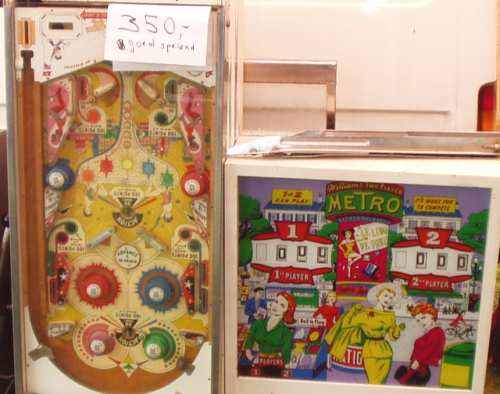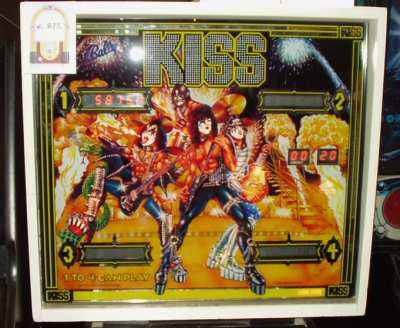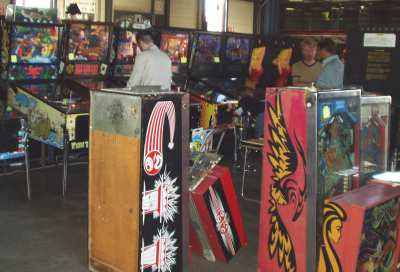Buying a pinball machine
Here are some guidelines for buying a pinball machine. These don't cover everything, although this document has grown substantially. It's meant to help beginners who are clueless about where to start.
You want a pinball machine. You search for pinballs for sale. You find a lot of machines, but don’t know how to choose the right one or spot a good deal, and naturally, you don’t want to be ripped off.
If you have any questions, need help, or disagree with something I say here, feel free to email me your comments. Also let me know if this page helped you, it's what keeps me motivated to update these pages.
An additional guide about choosing the right pinball machine for you can be found here. Please read that page too!
If you have a pinball machine for sale and live in (or near) Belgium, feel free to contact me.
About prices of pinball machines
Don't buy a pinball machine to get rich. You won't make a fortune buying and selling pins. There are exceptions: if you truly know what you're doing, have the right connections, plenty of time, a spacious warehouse, a large truck, significant capital to invest, repair expertise, maybe even a showroom in a good location or the ability to install machines in pubs, you might be able to make a living from pinballs and other amusement devices.
Alternatively, if you're quick to respond to every advertisement, buy early, then store machines until prices rise, or sell them at trade shows, you could turn a profit. But once you factor in storage, transport, and your time, that 'nice profit' shrinks quickly.
Don’t assume the one machine you buy now will be worth ten times its value in a few years (unless you got an incredible bargain). Some NIB (New In Box) machines appreciate, a Medieval Madness or TAF Gold might have doubled or even tripled in value if kept boxed. You’d likely have earned more investing in stocks or other assets.
On the other hand, NIB machines like Popeye or Stern Striker may have lost over half of their value. There are safer, more lucrative investment options. (By the way, if you own NIB pins, remember to remove the batteries!)
Used machine prices have risen significantly over recent years, especially in Europe, where they were previously undervalued due to low interest. Owners who amassed collections 5+ years ago are likely to see profits if they sell now. But I doubt we’ll see another price surge like that again.
The last few years, especially during covid, there was a boom in demand and prices for all pinball machines have increased a lot. Stern also increased their prices a lot each year. This resulted in a situation that a new machine had become much more expensive a year later. People who had bought a machine could resell their used machine for the same price as they bought it (of even with a profit) and it'd still be cheaper then buying a new machine that year. There was also a strong demand for the limited versions of the machines.
This demand seems to have softened now, also because there are a lot of new manufacturers who have interesting games. So it looks like it'll become a normal situation again that one will loose some money when you want to sell the game you bought new.

Old pins may be antiques, but that doesn’t guarantee value. If it’s in mint condition (and I mean perfect), you might find a collector. Otherwise, don't expect high prices. Most people prefer modern machines, they’re simply more fun to play.
An antiques dealer usually sells vintage machines for much more than a collector would, for a non-working or cosmetically poor old machine. And if it's been idle for years, restoring it could take many hours. Age doesn’t equal rarity, value, or demand.
Note: Some woodrails from the 40s and 50s do fetch high prices in Europe, not for gameplay, but due to collector interest and limited availability. But there are maybe a handful serious of collectors of these old machines.
Consider your pinball machine an investment
Yes, I know I said the opposite earlier. Let me explain. A pinball machine likely won’t make you rich, but if it's in good condition and you maintain it (regular cleaning!), you’ll probably sell it close to what you paid. You might lose a little, or earn a bit.
Overall, it's a better investment than other entertainment items, like toys that become trash in six months or home cinema systems that are outdated in three years. Pinball machines are entertainment that retains value better than most other hobbies.
Especially if you'd pay yourself 50 cents every time you play, these machines won’t lose money.
If you learn to repair them as a hobby, you can gradually build a collection. Many collectors started this way. Find a bargain, clean and fix it, enjoy it for a while, then sell with some profit. Repeat enough times and you’ll afford better titles. It only works if it stays a pure hobby, don’t count your time or transport costs, learn to repair everything yourself, and avoid paying for help.
For Europeans: U.S. prices are usually much higher than in Europe. Although prices in Europe are rising, it’s mostly happening for certain recent Bally and Williams machines, some might even cost more here than in the States :(
There aren’t many European collectors interested in older machines. That American price guide showing a 70s pin worth $2000 means little here, it's probably worth only 10 or 20 percent of that value, especially if it’s not in perfect condition.
Find a collector interested in your pin and then negotiate. Use catalog prices to compare unfamiliar machines, e.g., among pins from 1970–1975, see which are in higher demand (usually the most fun to play fetch higher prices).
If you really want American prices, don’t sell to me, try eBay. But remember to subtract their fees, account for exchange rates, money transfer costs, packaging, shipping (500 euro per pin), building crates (you can't use any regular wood, it has to be fumigated!), transport logistics, and customs paperwork. Don’t forget: once it’s crated, it’s too heavy to lift manually, you’ll need a forklift.
If the game is being picked up: many European shippers use large trailers without lifts. Specify your needs, or pay extra for proper equipment.
Want to send pins cheaply? You’ll need 50+ pins to fill a container for sea shipping. You must know how to stack them properly, handle customs, and have storage space. Answered ‘yes’ to all of that? Then go for it. If not, please don’t complain about not earning enough, reality’s a bit trickier than saying 'Buy for 750euro here, sell for 1500euro there.'

Some machines are collectibles because of their theme: Kiss, Star Wars, Star Trek, James Bond, Rolling Stones, etc. Collectors might pay more for these. But to most pinball enthusiasts, playability and condition outweigh logos. Know your buyer. If you're in a rush to sell, you might get less, but you’ll get quick cash, easy transport, and no long-term complaints.
Compare prices
Don’t buy the first machine you see. There are many out there. Look around, talk to operators, contact collectors, and gather opinions.
Consider the full package: someone might be 200euro cheaper, but are original parts intact? Is delivery included? Do you get a manual? Will someone service it in six months? Do you want to learn repairs yourself? Will you clean and adjust the machine or should it arrive perfect?
Note I have added a page with average prices in Belgium.
Where to buy a pinball machine

If you're a beginner, I strongly advise buying a working machine you can inspect and play before purchasing. Start local, avoid getting burned on eBay.
Look for dealers by scanning the yellow pages and calling amusement game vendors. Ask if they operate pins, not just sell them. Someone who doesn’t have one now might have one next month.
You may even find a showroom dealer, but expect premium prices. Given current trends, a refurbished pin in near-new condition might be worth the cost compared to a dirty machine that needs parts and work.
If you spot a machine in a pub, jot down the operator's contact and reach out.
If you don’t want to pay retail, connect with collectors. Search online for collector groups in your area. Some maintain sale lists and offer better deals than dealers.
But beware, some collectors love their machines and won't sell unless necessary. Others constantly buy and sell, offering machines that may lack ‘collector quality.’
Next option: look at ads like craigslist. Watch for machines for sale. Garage sales count too. If you don’t see ads, consider placing one, many machines end up in attics or basements.
Most machines found this way will have issues, and you won’t get support. Be careful when buying this way, especially if you're new to pinball repairs.
It’s important for beginners to buy locally: you’ll need support and warranty. Many things can go wrong, and even shipping might damage something. Without knowledge of repairs, local help is essential.
If you really can't find a local pinball machine, then consider buying from reputable sellers who offer shipping. Some trusted dealers will thoroughly shop a pinball machine and ship it safely to you. Do your research and look for dealers with consistently positive feedback.
Auction sites can also be useful, but caution is essential. Review the seller’s history. Are they established in selling pinball machines, or is this a one-off sale from someone who found an old game in storage? A description like “works 100%, looks new!” should always be verified—don’t take those statements at face value.
Always ask for detailed, high-resolution pictures. Photos should cover the playfield, cabinet, backglass, and electronics inside the machine. Don’t rely solely on the seller’s words,trust your eyes. If the seller avoids giving good pictures or detailed answers to your questions, move on to someone more reliable.
Request images of the underside of the playfield, connectors, boards, and even the coin door and legs. These parts reveal how well the machine was maintained. Signs of rust or neglect often point to deeper issues.
If possible, ask for a short video showing the machine in action. It gives you a better sense of how it plays and whether the features work properly.
Remember: shipping adds risk. Even a well-packed machine can suffer damage in transit. If you buy online, make sure the seller uses proper packaging and understands how to secure machines—legs removed, balls taken out, playfield locked, foam padding, shrink wrap, and strapped to a pallet. Fragile parts like plastics and ramps should be cushioned separately.
Also confirm shipping insurance and who is responsible if something gets damaged. Don't assume the seller will reimburse you. Clarify terms before paying.
About pinball machines holding their value
I've added this section since I've been asked several times recently: Do pinball machines hold their value? Will prices rise? Should you spend a fortune on something like Medieval Madness?
Some of this has been said earlier, but here's a recap. I can’t tell you whether you should spend your hard-earned money on MM or any other expensive title. That’s a personal choice and only you know what feels worth it.
Yes, quality pinball machines tend to maintain their value, especially in good condition. They likely won’t double in price overnight, but they also probably won’t depreciate drastically unless mistreated. I do expect prices to increase for mint-condition machines and to drop for worn-out games.
Collectors are increasingly selective. Many now only want pristine, fully restored games. Meanwhile, in Europe, electro-mechanical (EM) pins are still relatively affordable, but interest in them may grow, leading to higher prices over time.
It all comes down to supply and demand. Bally and Williams games from the 90s surged in value after Williams left the market and Stern initially p roduced low-quality replacements. For a while, demand stayed high and supply dropped—classic economics.
That trend may shift. Stern now makes better machines with good gameplay, better build quality, and modern features. But their lower production runs and unknown long-term durability (e.g., playfield wear) make it hard to predict their impact on used game prices.
Keep in mind: Williams didn’t do reruns. Once Medieval Madness stopped production, demand continued but supply was frozen. Stern, on the other hand, sometimes re-releases popular titles. This affects collectibility and long-term value.
So investing in NIB Stern machines is uncertain. Hot titles might see prices rise—but only if demand exceeds supply and no reruns occur.
Prices were also low back then because most machines were written off by operators—no longer earning money, dumped cheap, sometimes even destroyed. Pinballs were considered obsolete toys, not collectibles. That changed as more hobbyists entered the scene.
Of course, there’s a ceiling to how much a pinball machine can appreciate. MM or other top-tier games may match or exceed the price of new Stern titles, but if Stern keeps releasing solid new games, the number of older games that outperform them may dwindle.
So while some older games may remain highly sought-after, it's unlikely that average pins will surpass the price of new machines designed with today’s tech and gameplay preferences.
No one knows how the market will evolve. Maybe in ten years, a new pinball format will emerge, something like what Williams did with Pinball 2000, and today’s machines might feel outdated. Technology evolves fast. Remember how solid-state machines replaced EMs, and dot-matrix displays rendered older systems obsolete.
It’s not guaranteed, but it’s possible. A revolutionary new design could dramatically shift collector interest and market value.
Should you buy Medieval Madness?

It's not because a game is difficult to find or expensive that it's impossible to find.
Picture by Bill Chavez.
Play it. That’s the best advice I can give. If you love it and can afford it, go for it. I’m personally thrilled I own mine. It gets the most playtime among all my machines, and I wouldn’t part with it for anything. But that’s just me.
Many still consider Medieval Madness the best game ever made. Whether it deserves that title is up to you, but its reputation alone has helped it retain value.
Of course, this is all just my personal view. I could be wrong. Market trends change, and what holds true today may shift tomorrow.
Update August 11, 2003: Prices for collectible Bally/Williams machines like Monster Bash and Cirqus Voltaire continue rising. Not sure they’ll surpass NIB Stern prices, but it’s not impossible.
Collector interest is growing. Most newbies want one affordable machine, but many eventually catch the bug and become serious collectors. Demand is increasing, while supply isn’t.
Additional update – May 2004
Same trend: prices still climbing in the USA, even for older machines. New collectors want “must-have” titles. Stern’s Lord of the Rings impressed many and was widely bought for home use.
In Belgium and the Netherlands, pricing is strange. Ultra-expensive games saw price drops due to limited demand—especially with LOTR gaining popularity. Some MM machines now go for €3500–€4000, a more reasonable range.
Meanwhile, cheaper titles are becoming harder to find. A good DMD game under 500eurois rare now. Many great pins were shipped overseas in containers to the USA, reducing local supply ����
Prices in the USA are still rising, especially for mint-condition classics. So I expect games like Funhouse, Theater of Magic, and CFTBL to rise in European markets too—at least if they’re in excellent shape.
Some older games are also making a comeback. Titles like Earthshaker and Whirlwind are drawing fresh attention from collectors.
Update 2025
So we're 20 years later now since I wrote this original article. Prices have increased a lot since then. COVID did spike demand for all games, especially older games in not so perfect condition increased a lot. Lately the market is cooling down again.
If you're looking for pinball parts, then check out Pinballshop.nl (affiliate link).
